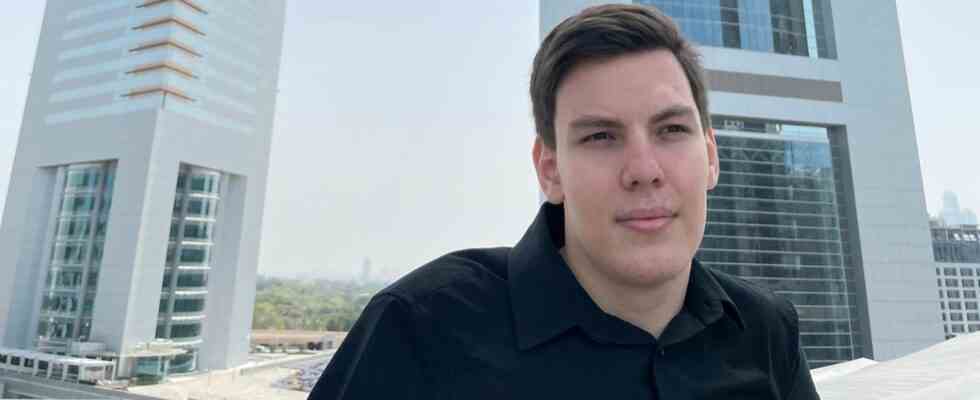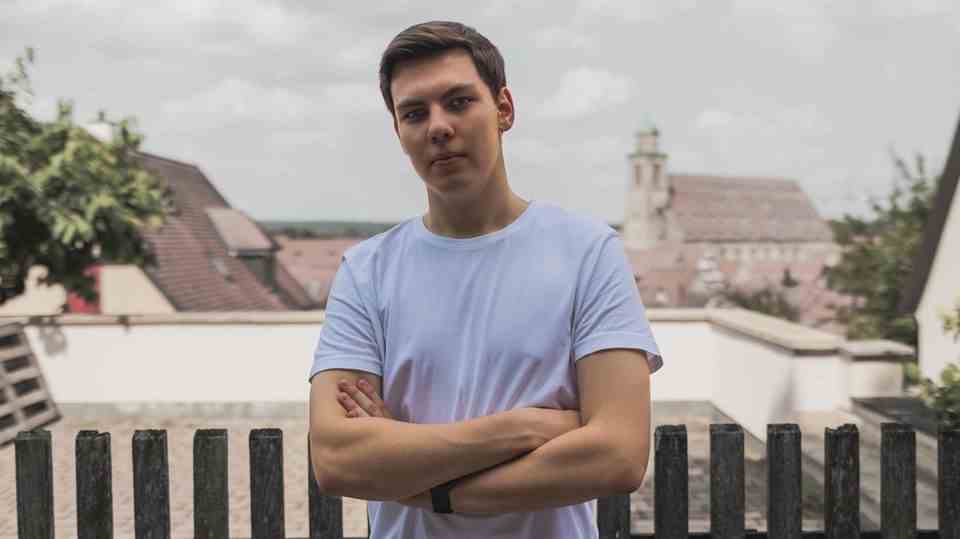The German economy complains about a shortage of skilled workers and a lack of IT specialists. The 19-year-old David Colombo, an exceptional talent in the local IT scene, explains this star in an interview why it will probably stay that way.
David Colombo made a name for himself as a “Tesla hacker” earlier this year. The 19-year-old managed to reach vehicles all over the world from his childhood bedroom in Dinkelsbühl, Franconia, and to trigger certain functions for test purposes, after asking the owners for permission beforehand. In mid-January he explained that starhow he had succeeded. This hack, which received international attention, was preceded by almost ten years of incessant study – but not in school.
Colombo has been concentrating on IT security and his company since he was 15. Thanks to a special permit from the Nuremberg Chamber of Commerce, he only attended school 1-2 days a week. He learned programming at the age of ten, alongside Tesla he also got into the Red Bull systems and reported a vulnerability to the US Department of Defense. In short: David Colombo is the kind of person German business means when they talk about skilled workers. But they probably won’t get it. The young entrepreneur spoke to him about the reasons star.
David, nice to hear from you. A lot has happened since your Tesla hack. Tell me.
David Colombo: I’m currently traveling a lot. After the hack, I received invitations from all over the world, including Tel Aviv and Dubai. Then it went straight to San Francisco and Silicon Valley. There I can network with many people from the industry and talk about my work, as I see cyber security as one of the cornerstones of a digital future. After that, I’ll probably decide where to continue for me professionally and privately. Not in Germany.
A blatant decision. How come?
David Colombo: Probably because I received invitations from all these countries and they showed real interest – and nothing came from Germany. (laughs) No seriously: I come from Dinkelsbühl, in the middle of nowhere in Franconia. Absolutely no one talks about innovation and technology here – and for a long time I thought that was completely normal. It was only on my travels that I noticed how left behind people are here.
on what?
David Colombo: Well, let’s take Dubai as an example. Everyone I spoke to there had a desire and passion for technology and future topics. And that’s not talk, you can tell. Let’s say you have to apply for something for your visa or something at the office. In Germany: Off to the office, wait a long time, paperwork, paperwork. In Dubai you do it online and you can tick it off. Sometimes it’s the sum of the little things.
Okay, but that can’t be the reason.
David Colombo: No, but that’s where it starts and how these countries think. Another example: Tel Aviv. Every adult has to join the military. But they don’t just crawl across fields and fold their shirts to A4 size, many end up in the tech and intelligence units, i.e. cybersecurity, and are trimmed for it. As a result, you suddenly have a country full of young people who are fully into the subject and know their way around. Ultimately, this also shapes the digital landscape and corporate culture.
You mean in young companies?
David Colombo: Absolutely. Innovation is the focus there, not bureaucracy. Anyone founding a company in Germany is really crazy. (laughs) The difference is just too big for me to stay here.
But now you’re also comparing the Franconian Jura with conferences and meetings, which are thematically very specific, aren’t you? Didn’t you have any similar experiences in Germany?
David Colombo: Of course there is also a scene and such conferences in Berlin or Munich, but I’m not only referring to these meetings, but to the mentality of these countries. That brings us back to Dubai: All the heads of government and ministers are in the Emirates Towers and the Youth Hub is on the lower floors, where young people can work on cool projects and be seen. The Minister for Digital Economy has his office in the Dubai Future Lab, five meters from the robots and drones that are currently being developed there. The attitude on the part of the government is just right and you can see how important technology and innovations are to them.
And Germany? What concrete hurdles did you encounter here that influenced your “mindset” so much?
David Colombo: For example, registering my company with my tax ID took months. That’s it. And then you keep coming across situations where you suddenly have to print out something and fax it to some booth. You know how daunting that is for young people like me who just can’t understand why we’re so grossly outdated here? You often remain speechless and start pondering. Unfortunately, I keep having similar negative experiences with the people here in the country.
What do you mean?
David Colombo: My Tesla story has brought me into conversation with an incredible number of people. Most of them were honestly interested and really cool. Guess from which country the people who immediately sought an advantage and wanted to take advantage of my work came from?
Germany?
David Colombo: Absolutely correct. The only people I have had negative experiences with came from German-speaking countries. I remember this management consultant who immediately wanted to advertise with my face and immediately became rude and rude when I declined. Nobody really wanted to talk about the work itself, there was simply no honest interest in the topics. It’s just so much better elsewhere.
And that’s enough reason for you to seek your luck elsewhere?
David Colombo: Yes, right. German industry is crying so loud about the shortage of skilled workers – but if you offer such an environment, even at federal level, then you shouldn’t be surprised. People like me think differently, we function differently. And why should you expose yourself to that when you can work on exciting projects elsewhere immediately and the structures have your back free? After just three weeks in Silicon Valley, I know how great work can be when the environment is right. Lo and behold, you still meet other German talents who are now here instead of getting stuck at German companies.
What do you think needs to change?
David Colombo: The whole mindset and corporate cultures urgently need to change. I don’t want to be pressed into a corset where I sit somewhere eight hours a day in a suit. I want the work, the projects and the result to count, not politics, hierarchy and all those restrictive rules. In Tel Aviv, IT professionals sit on the beach in flip-flops and still work efficiently, sometimes at night, but not during the day. You don’t have this flexibility here in many places. I just don’t have enough fun. However, if you enjoy your work, you work much longer and more effectively. Thats how it is for me at least.
Where should the change start?
David Colombo: Well, look at my resume. At school of course. When I was 15 at the latest, I asked myself why I was actually sitting there and interpreting some poems about pear trees. Who does that help? You don’t hear anything about the really important topics of this time, nothing at all. Again, the main thing is that you have fixed structures and act as inflexibly as possible. Awful.

Have you ever experienced it differently?
David Colombo: Yes, again in Dubai. The Minister of Education was previously responsible for entrepreneurship, so he comes directly from business and was CEO of a company for renewable energies. They just set their priorities differently. I mean – they have a Minister for Early Childhood Education. From the age of four, the kids come into contact with topics that you either learn autodidactically here or just oversleep. That simply does not work. I don’t even want to know how many talents are currently being left behind. Not really.
What kind of degree do you actually have?
David Colombo (laughs): Technically, I have a high school diploma. After school, I was still at the vocational school for the 1-2 days, but I didn’t graduate there because it didn’t make any sense to me. At the latest when a teacher wanted to teach us code with a clear vulnerability, I knew that it wouldn’t do any good. But I don’t blame any teachers for that. The people who represent the spearhead of the German IT scene would never take an apprenticeship under the current conditions. There is simply a lack of staff and money.
So? What are the next steps for the Tesla hacker?
David Colombo: After all the trips, I go into myself because I don’t know which doors will open to me at the moment. Maybe I’ll continue to run my company for the time being, maybe I’ll join a start-up or Silicon Valley company. There are now some good offers on the table (laughs). The main thing is that I work with exciting and brilliant people in a cool environment – without unnecessary hurdles.





